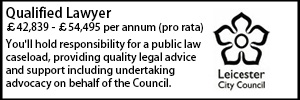Family President rejects bid by council for change to experts instructed in injury case
- Details
The President of the Family Division has rejected a local authority’s application to change the expert witnesses instructed in an injury case, in which a young child sustained a suspected fracture in a context which had “no other indicators” of child abuse.
In A Local Authority v K & Ors [2024] EWCC 18 (22 October 2024), the Family President concluded: “The impact that the expert reports will have in these proceedings will be significant. If the experts say this is child abuse, then that opinion – subject to any further opinions that are sought – is likely to be of very persuasive weight in the court process. Equally, if the expert says that a medical explanation, which is entirely acceptable, albeit unusual in this case, that too is likely to have a major impact. […] It is, therefore, very important that the parents should have confidence in the expert who is going to deliver that opinion, one way or the other. These parents, I am told, have confidence in Dr Cartliedge.”
The case concerned the instruction of expert witnesses in pending care proceedings relating to four children.
The proceedings commenced following a single event of concern, which was that the youngest of the children, who was then aged just a few months, seemed to have sustained a fracture to his left humerus.
On 28 August, Recorder Roscoe made directions, giving leave for the instruction of two experts – a consultant paediatric radiologist and a consultant paediatrician, and for them to report on the injury.
The Family President said: “Matters proceeded, but fairly shortly after the Recorder had made his Order, it became apparent that the Legally Aided parties were going to be limited by the Legal Aid Agency in the amount of fees that the Agency would contemplate, it being the Recorder's decision that the costs of each of the two experts would be split four ways, between the Local Authority, on the one hand, and the three Legally Aided parties on the other.
“I am not going to insert into this judgment the detailed finances. But suffice it to say that the result was to require a very significant contribution by the Local Authority, to top up the fees, particularly with respect to the consultant paediatric radiologist, Dr Olsen. The consultant paediatrician, Dr Cartliedge, had been the subject of dispute before the Recorder. The parents, on advice, had selected Dr Cartliedge as being, as was said in submissions a short time ago, the 'gold standard' paediatrician for a case of this nature. Certainly, it is not for this Court to attribute badges of merit. But it is plainly the case that Dr Cartliedge has, for many years, been an expert of the highest repute in the Family Court.”
The local authority had had cause to review its ability to finance any additional payment over and above the norm, in cases of this sort, the Family President said.
In the present case, counsel for the local authority told the court that in the month prior to the hearing, the authority's policy changed, so it was no longer in a position to pay anything more than the pro-rata rate split between themselves and any Legally Aided parties.
The local authority identified two alternative experts, who they said were of “similar experience and reputation”, to undertake the required expert analysis and reporting.
The council then made an application to revoke the Recorder's Order, identifying Dr Cartliedge and Dr Olsen, and replace them with a Dr Rose (as the paediatrician) and Dr Oates (as the paediatric radiologist).
The Family President noted: “That was the way that the issue was set up before the hearing commenced, but it is now the case that the parents have considered the position and accepted that the rate of pay that would be required to retain Dr Olsen as the instructed expert represented a very significant additional contribution being required by the Local Authority. They have, therefore, agreed that Dr Olsen can be replaced by Dr Oates. […] There is, however, a remaining issue about Dr Cartliedge.”
The parents submitted that the instruction of Dr Cartliedge should remain, and the local authority should be required to contribute the excess.
Counsel for the local authority submitted that whilst of great importance to the parents and to the children, it was not a case of the highest order of complexity requiring the instruction of an expert, such as Dr Cartliedge, to whom the status of 'gold standard' might be attached.
The authority submitted that Dr Rose, working in a mainstream hospital in the centre of Birmingham, would be “well placed” to provide the necessary opinion.
Considering the parties’ submissions, the Family President said: “The parents particularly sought the instruction of Dr Cartliedge. They were entitled to do so. Any litigant is entitled to put forward their choice. But this was the parents' choice, and the Recorder endorsed it, and there is a particular need, in a case such as this – and those of us who are experienced in these courts come across cases such as this, every now and again – where the allegation of physical injury sits entirely on its own, in an otherwise benign family setting. So to a degree, this injury is a bit of a 'head scratcher', and it is necessary to have confidence that the expert who gives an opinion from a paediatric perspective is so experienced as to have contemplated the range of outliers that is unusual but, nonetheless, scientifically sound medical explanations that might exist. Dr Cartliedge is one such expert.”
He added: “The impact that the expert reports will have in these proceedings will be significant. If the experts say this is child abuse, then that opinion – subject to any further opinions that are sought – is likely to be of very persuasive weight in the court process. Equally, if the expert says that a medical explanation, which is entirely acceptable, albeit unusual in this case, that too is likely to have a major impact. This is a very important element in the evidential jigsaw in this case, because of the unusual circumstances that I have described.
“It is, therefore, very important that the parents should have confidence in the expert who is going to deliver that opinion, one way or the other. These parents, I am told, have confidence in Dr Cartliedge, in the way that they do not – because they have not gone on the journey that has got them to that position – in Dr Rose.”
Rejecting the local authority’s application, the Family President concluded: “I am conscious this application to change things happens because the policy has changed since the Recorder made his decision.
“I was sympathetic to the Local Authority's position, when Dr Olsen was included in the equation. But now, looking at it in the way that I have described it, and hearing what is said on behalf of the parents about the degree to which they are invested in Dr Cartliedge, and looking at the now relatively modest amount of money that is required to retain his instruction, I refuse the Local Authority's application to change the paediatrician to be instructed, from Dr Cartliedge to Dr Rose. I endorse the agreement, as it now is, for Dr Olsen to no longer be instructed, but to be replaced by Dr Oates.”
Lottie Winson














































